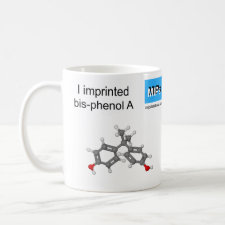
Authors: Alexiadou DK, Maragou NC, Thomaidis NS, Theodoridis GA, Koupparis MA
Article Title: Molecularly imprinted polymers for bisphenol A for HPLC and SPE from water and milk.
Publication date: 2008
Journal: Journal of Separation Science
Volume: 31
Issue: (12)
Page numbers: 2272-2282.
DOI: 10.1002/jssc.200700643
Abstract: Molecularly imprinted polymers (MIPs) for bisphenol A (BPA) were prepared by two synthetic routes: semi-covalent and noncovalent methodology. The molecular imprinting effect was evaluated using the polymers in HPLC and SPE. Polymers prepared with noncovalent mode were proven more effective. These polymers were applied in SPE facilitating selective retention of BPA from bottled water and milk. The developed sample preparation was simple and efficient comprising only dilution of milk and MISPE prior to LC-MS analysis. Overall MISPE enhanced sample clean-up. Compared with control nonimprinted polymers and conventional C18 SPE cartridges, the MIPs exhibited selective analyte recognition. The method provided quantitative BPA recoveries, very good reproducibility (% RSDs lower than 7%), and low LOD (0.2 ng/g). MIP interacts similarly with deuterated BPA allowing its use as internal standard in LC-MS. The most critical parameters of MISPE were the organic content in loading-washing medium and the washing volume. Low flow rates in the elution step enhanced extraction recovery. Important advantages of the MIP were: the high breakthrough volumes (> 500 mL of water), high mass capacity (> 10 ng/mg of MIP sorbent), good linearity, and good stability in performance for over 35 cycles of use.
Template and target information: bisphenol A, BPA
Author keywords: bisphenol A, LC-MS, milk, molecular imprinting, SPE



Join the Society for Molecular Imprinting

New items RSS feed
Sign-up for e-mail updates:
Choose between receiving an occasional newsletter or more frequent e-mail alerts.
Click here to go to the sign-up page.
Is your name elemental or peptidic? Enter your name and find out by clicking either of the buttons below!
Other products you may like:
 MIPdatabase
MIPdatabase









